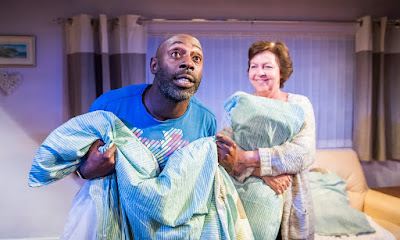'While We're Here' review or 'Shall we open the curtains?'
While We’re Here – Barney Norris
Bush Studio, 1st May 2017
Barney Norris knows people. A
lot of playwrights think they know people – but what they really know is their
own ideas, and who might express them best. Barney Norris knows places. Some
playwrights think they know places – but what they really know is how to use
places to best frame their play. Barney Norris knows people and he knows places
and he isn’t afraid to give them absolute prominence in his rich, warm and
subtle plays. I cherish him and his plays for that.
The people in ‘While We’re
Here’ are, typically for Norris, the type of people who might appear at the
edge of other plays and, perhaps, our own lives (especially if those are
London-lives). They are divorcee Carol, who works at the local council and British
Nigerian Eddie, who was brought up in foster care and has – in one way or
another – been looking for a home ever since. The place is Havant and Carol has
lived there all her adult life. You probably haven’t been there. Havant is in
Hampshire, somewhere between Portsmouth and Chichester. It is an in-between
place. It is the type of place that Carol’s daughter, Leanne, was desperate to
escape as soon as possible.
The play unfolds twenty or so
years on from when Eddie and Carol first met and became lovers. That turned out
to be the biggest moment in Carol’s life, only she didn’t realise it at the
time. She thought her life would be bigger. She thought she would have other
moments, other lovers, other chances.
Barney Norris’s play –
directed with customary and instinctive feeling by Norris’s long-term
collaborator Alice Hamilton – is deceptively simple. There are very few ‘big’
moments of which to speak. Sometimes the production comes perilously close to
feeling flat and empty, without that big loud engine that so often propels
plays forward. But that is because Norris has written a play that reflects the
stuttering and quiet rhythm of life. This is a play that will slide right past
you and it is only much later, with a start, that you will realise that there
was real life in those scenes: tragedy, comedy and passion, but so muffled by
the fabric of life that you risked missing them altogether.
Some scenes in here all-but
split these characters in two and point directly to their centre. As Carol and
Eddie grow tentatively close – reunited after all these years – they become
instinctively honest with each other. Carol talks to Eddie about her divorce
and lands on a truth that seems to underscore her life: ‘Sometimes I think my
whole life might’ve been a frightening time.’ Tess Peake-Jones stumbles across
this revelation with heart-breaking spontaneity. She sits frozen on the sofa
and, in a quiet voice and with a distant look on her face, sees her life with
absolute clarity. And then she sniffs or chuckles and the moment is gone.
Eddie – who Andrew French
injects with an edgy restlessness – also has moments when the truth about his
life seems to reveal itself. But Eddie’s revelations feel ever so slightly
staged. It is the doubts that I have about Eddie’s character, which stop me
from falling unreservedly for ‘While We’re Here’. Eddie’s moments of insight
come wrapped up in someone else’s story or myth and end with this line: ‘Someone
falls in love with him – and he gets to go home.’ It feels fractionally forced and,
in a play this subtle and understated, even the slightest strain really shows.
But I will think about these
characters – who seem to stumble upon the reality of their lives almost by
accident – for some time. In the final scene, Carol sits on her sofa and
absently confesses: ‘I think I’ve been under some stress.’ The curtains are
shut and the light is fading and this small play suddenly feels very big; an endless row of sofas framed in a half
light, hidden behind closed curtains.



Comments
Post a Comment